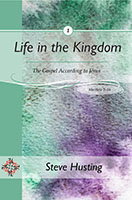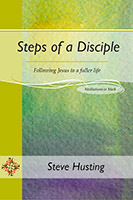In Hebrews 11, we are introduced to a series of individuals who were known for their faith. Noah prepared an ark, expecting a flood. Abraham moved out of his country at the word of God, not knowing where he was going. Sarah believed God, and birthed a child in her old age. Moses left the pleasures of Egypt to journey with the people of God. They were not just known for faith – but an enduring faith; they were tested in hard circumstances and kept on trusting in God no matter what.
In Hebrews chapter 12, the spotlight swings to the readers of the epistle. “Surrounded by so great a cloud of witnesses” (12:1), the witnesses of God’s faithfulness noted in chapter 11, what are we to do?
While Moses rejected the riches of Egypt to side with God’s people over the desert, many Christians love their comfort and collapse into pettiness when it is compromised. We have little endurance in faith to punch through our trials. So the Word tells us to look to one more example of faith and endurance: Jesus Christ on the cross.
Jesus resisted all efforts of the enemy to turn Him from the will of God, even the pain of the cross. “You have not yet resisted to bloodshed, striving against sin” (12:4). We quickly give in to our sins and weaknesses rather than strive mightily against them. How well do we endure pain and hardship? Do we believe that God allows pain in our lives? Do we believe that God’s blessing is best seen with wealth and comfort, and pain and suffering is proof of God’s displeasure?
I can look at my “spare tire” and decide I should lose a little weight. Then I give in to the first cookie I see, saying, “just one more won’t hurt.” We do not strive to bloodshed as did Christ in Gethsemene when He sweat drops of blood in prayer. We know Jesus came to save us from our sin, but we are not committed to make that salvation a reality; we will not take a stand against sin because it’s too hard, or we still love it.
And yet this attitude of standing for Him and His purposes is what God will recognize and honor. This is the attitude God will empower with His Holy Spirit: “For the eyes of the LORD run to and fro throughout the whole earth, to show Himself strong on behalf of those whose heart is loyal to Him” (2 Chronicles 16:9). At some point in their lives, the heroes of faith in chapter 11 took a stand for God and stood firm in that area despite hardships. And God showed himself strong through them. “Therefore God is not ashamed to be called their God, for He has prepared a city for them” (11:16). They will be rewarded with a privileged place in the kingdom. From the context, those who strive to maintain faith in trials will receive the greatest honor.
The heroes of faith were not known only for their beliefs of faith, but actions of faith. They did not merely believe strongly, they acted decisively on what they believed in. They clearly saw Him who was invisible (11:27), and resisted the pull of the world, the flesh, and the devil to move them away. But we have a better picture of God than they did: the demonstration of His love for us on the cross.
The epistle of Hebrews repeatedly encourages its readers to continue and not fall back. The readers of the epistle were moving away from the steadfast faith of their fathers. They were not remaining firm in their faith in Christ, but possibly moving back to their roots of Judaism, trusting in the laws of Moses rather than the new covenant of faith. This may be why the epistle keeps showing us the insufficiency of the OT in contrast to the supremacy of Christ.
We must enter the kingdom through many tribulations (Acts 14:22), for through them we may learn that God will help us as He did those in chapter 11. If we see our hardships as from a Father who is training His children, we may alter our mindset regarding suffering. We may learn to endure hardships as soldiers do (2 Timothy 2:3).
The audience of this epistle, like many of us, were weak-willed. We half-heartedly pursue the things of God. Our godly efforts start and stop and sputter to nothing. James warned us, “But let him ask in faith, with no doubting…. For let not that man suppose that he will receive anything from the Lord” (James 1:6, 7). We are two minds of a matter and go hesitantly back and forth instead of running in the way we should go.
So we are sternly commanded, “strengthen the hands which hang down, and the feeble knees, and make straight paths for your feet, so that what is lame may not be dislocated, but rather be healed” (12:12-13). Be determined to put those hands back into the work of the Lord. Turn the feet resolutely to the path they were on before we backtracked or went off the road. Be firm in what is right and be strong.
I’ve come upon people who have a bitter outlook on life. Life is hard; everything is against them; they never get an even break. These men have never accepted the training in righteousness that comes from trials; instead of knowing peace because God is with them in the trials, they’ve gotten bitter for having to go through it kicking and screaming. We are told to be “looking diligently lest anyone fall short of the grace of God, lest any root of bitterness springing up cause trouble, and by this many become defiled” (12:15). These bitter old men and women are defiled with their dark thoughts, having never taken hold of the help that has been available from the beginning of their new life in Christ.
We are given the tale of Esau as a warning (12:16-17). He returned home tired after a day of hunting and his brother Jacob, with one thing on his mind, tempted him with a savory stew. Jacob, who knew his brother was a profane man who only cared for the things of the flesh, said, “I’ll give you this stew if you’ll give me your birthright.” Esau gladly traded in his birthright, thinking only of how dead tired he was feeling at the moment (Genesis 25:27-34). Esau was weak-willed in the things of God. When his physical exhaustion overcame him, he could not resist the earthy aroma of beef stew, and rejected God’s eternal plan for him.
In earlier chapters, the author of Hebrews had impressively shown the readers the surpassing superiority of Jesus over angels (1:5-14), Moses (3:1-6), Abraham (7:1-8), and the Levitical priesthood (7:9-27). His blood is better than that of the sacrificial animal offerings (10:1-10), and His covenant is better than the OT covenant (8:7-9:15). Jesus is better in every way compared to the old way of doing things. Why turn away from God’s better and sure way through Christ?
Perhaps we are complacent because we heard that we need only acknowledge that Christ died for us and we are assured of eternal life. The book of Hebrews, however, wants us to progress to maturity of character. Over and over, the author urges us to gain the rewards of a faithful life, not an intellectual set of beliefs about Jesus (in previous paragraph). In this epistle we have been given many good reasons to believe in Jesus, even to encourage us to forsake all things that are contrary to Him. The excellency of Jesus convinces us to turn from this world to live for Him who will reign in the world to come. Of the heroes of faith we are told, “These all died in faith, not having received the promises, but having seen them afar off, were assured of them, embraced them, and confessed that they were strangers and pilgrims on the earth” (11:13). They were people of hope, having an expectation that God will give them all He promised them in the coming kingdom age. They were strengthened in patience to wait for it. Do we yet pray in earnest, “Thy kingdom come”?
Knowing what they knew of their God, they could no longer call this earth their home. This is not a normal reaction to our suffering and trials. Our natural response is to run away from suffering, to find relief in the things of this world. We don’t get this kind of looking-to-God mindset by mentally believing in the things of God, but by trusting Him in hardship and finding Him true when He follows through with His aid. It’s in the hard times when we see God’s strength holding us up, and it’s in those times that we realize we don’t need to hold onto the things of the world or ourselves. This is the purpose of God’s training us in hardship: that we look to Him alone; that we develop the inner conviction that He is sufficient for us. This is the rest God promises His people (4:1-10). This is the inner strength of character that is formed by exercise of self-discipline during hardships.
The book of Romans supports this point. In chapter five we are told that our faith is a progression: we have good attitudes in tribulations, knowing that tribulation produces perseverance (haven’t we been talking about that?), and perseverance character, and character hope (Romans 5:3-4). This hope is the hope of the next life mentioned earlier that characterized the heroes of faith – they rejected this life for the world to come. This is the maturing faith God wants to see in His children. It indicates that they are growing up; they are learning their lessons.
Hebrews 10:32-34 tells us of the Hebrew churches’ previous struggles with sufferings: they were reproached by others; they sided with others who suffered; they gladly gave of their goods to help others; they were confident that they had an enduring possession in heaven. They once had the grace to endure these things with happiness and shrug off any shortcomings. At the time of the writing of the epistle to the Hebrews, that was in the past.
Are we looking back to good deeds and church attendance for our well-being? Do we depend on our past good things to give us continual good favor with God? Do we compare ourselves with worse people and conclude we’re pretty well off? We are reminded that without faith it is impossible to please God. The grace of God – His favor and aid – are released through faith in Him.
Paul wrote of this matter to the Galatian church: “This only would I learn of you, received ye the Spirit by the works of the law, or by the hearing of faith? Are ye so foolish? Having begun in the Spirit, are ye now made perfect by the flesh? Have ye suffered so many things in vain?” (Galatians 3:2-4). Paul expected their hardships to turn them to rest in God, but now wonders if all their sufferings were in vain. They were turning to the laws of Moses rather than trust in Christ.
The strength of will to endure hardships in patience comes by looking to God, not our good deeds or church-going or religious status. When we look to God, then we find God supplying us with strength to endure. We don’t need more hours of rest in leisure activities or sitting front of a TV or computer, but to choose the better part that Mary did: paying attention to Jesus.






